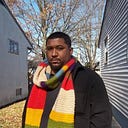Member-only story
A Black Folks’ Guide to Cthulhu and H.P. Lovecraft
Lovecraft was an unapologetic White supremacist — who just so happened to be one of the most influential figures in 20th-century fiction
Update 6/7/22: Level has a new home. You can read this article and other new articles by visiting LEVELMAN.com.
Six years ago, I started writing a horror novel. The idea was to create a contemporary parable that utilizes elements of H.P. Lovecraft’s canon of creatures and old gods — which places me in a long line of thousands who have used the writer’s public-domain ingredients to build stories. The thing that separates me from about 99% of the artists who engage Lovecraft’s literary bric-a-brac of ghouls, aliens, and existential dread is that I am Black. Lovecraft, you see, was not just one of the most influential figures in fiction of the last century, he was also an unapologetic White supremacist.
Lovecraft’s racism manifested more in correspondence with others (of which there are copious amounts) than in his art, but the two are inextricably linked. There are obvious examples: In the story “The Rats in the Walls” a character’s dog is named “Nigger-man.” Lovecraft penned a poem entitled “On the Creation of Niggers,” which is as bad as it sounds. Other instances are more…

